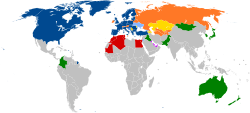History
After the end of World War II, the creation of West Germany became a key aspect of the Cold War. The United States viewed the remilitarization of West Germany as a vital means to counter Soviet expansion. West Germany joined NATO in 1955. This step was of great importance both for strengthening the defensive system and for restoring German sovereignty. [1] [4]
After the unification of Germany in 1990, it remained part of NATO, which made the Alliance a more political entity aimed at ensuring stability in Europe. [2]
Germany's role and contribution
NATO is the cornerstone of German security and defense policy. Germany's security is closely linked to the security of its allies. [3]
Germany is making a significant contribution to strengthening the Alliance's military power and sharing responsibilities, which underscores its importance in this organization. [1] [5]
Germany is a supporter of transatlantic cooperation and stands for the maintenance of peace, stability and democracy within the framework of a multilateral order based on principles. [6]
This page is based on this
Wikipedia article Text is available under the
CC BY-SA 4.0 license; additional terms may apply.
Images, videos and audio are available under their respective licenses.

